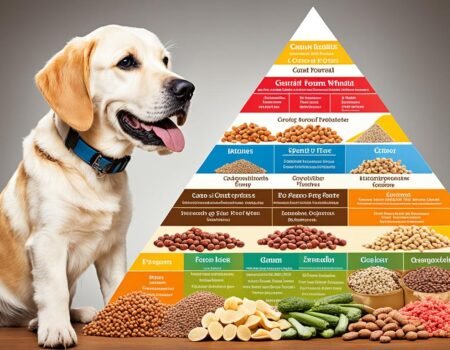As a dog owner, I know firsthand the heartbreak of watching our furry friends suffer from allergies. It’s heartbreaking to see them constantly itching, scratching, and dealing with digestive issues. We want nothing more than to provide them with relief and a comfortable, happy life.
That’s why I want to share with you the incredible benefits of grain-free dog food for allergic dogs. It’s a game-changer for pups with food sensitivities, and it can make a world of difference in their overall well-being.
When my own dog, Max, started experiencing allergies, I was determined to find a solution. After doing extensive research and consulting with my veterinarian, I discovered the power of hypoallergenic dog food that eliminates common allergens like grains. The transformation in Max’s health was incredible – his itching reduced, his skin became less red, and his digestive issues improved.
Now, I want to help you understand more about dog allergies, food sensitivities, and how grain-free dog food can be a game-changer for your beloved pups. Together, we’ll explore the benefits, top picks, transitioning tips, and much more.
Key Takeaways:
- Grain-free dog food can provide relief for dogs with allergies and food sensitivities.
- Common food allergens for dogs include chicken, beef, wheat, soy, and dairy.
- Choosing high-quality, natural ingredients is crucial when selecting grain-free dog food.
- Transitioning your dog to grain-free dog food should be done gradually to avoid digestive upset.
- Consulting with a veterinarian is essential to determine the best approach for your dog’s specific dietary needs.
Understanding Dog Allergies and Food Sensitivities
Dogs, just like humans, can develop allergies and food sensitivities. If your dog is experiencing symptoms such as itchy skin, ear infections, or digestive issues, it may be a sign of a food allergy or sensitivity. Common food allergens for dogs include chicken, beef, wheat, soy, and dairy.
To determine if your dog has a food allergy, a dietary elimination trial or food trial can be conducted with the guidance of a veterinarian. During this trial, you will feed your dog a hypoallergenic diet for 8 to 12 weeks while eliminating all other potential food sources, including treats and human foods. By doing so, you can pinpoint the specific ingredient that may be causing the allergy.
Avoiding common allergens like wheat gluten and soy can also help manage food allergies in dogs. It’s important to carefully read ingredient lists on packaging to ensure you’re choosing dog food that doesn’t contain these allergens.
Additionally, switching to a limited ingredient diet or introducing novel proteins can be effective for dogs with food sensitivities. Limited ingredient diets contain a smaller number of ingredients, reducing the likelihood of triggering an allergic reaction. Novel proteins are proteins that your dog hasn’t been previously exposed to, making them less likely to cause an allergic response.
If you suspect your dog has food sensitivities or allergies, it’s crucial to consult with a veterinarian to determine the best approach for their specific dietary needs. A veterinarian can provide guidance on the right dog food for food sensitivities and help you create a diet plan that supports your dog’s overall health and well-being.
The Benefits of Grain-Free Dog Food for Allergies
Grain-free dog food offers numerous advantages for dogs with allergies. By choosing high-quality, natural dog food that is free from common allergens, such as grains, you can provide your furry friend with a diet that promotes optimal health and addresses their specific needs.
1. Improved Digestion
Grain-free dog food is often easier for dogs to digest compared to traditional dog food that contains grains. The limited ingredient dog food formulations eliminate common allergens that can trigger digestive issues, making it a suitable choice for dogs with sensitive stomachs or food sensitivities.
2. Promotes Healthy Skin and Coat
Many dogs with allergies suffer from skin irritations and dull coats. Natural dog food, without grains, may help alleviate these issues. By providing your dog with a high-quality diet that includes premium proteins and essential fatty acids, you can support their skin health and promote a shiny, lustrous coat.
3. Reduces Allergic Reactions
Limited ingredient dog food eliminates potential allergens found in grains, such as wheat and soy, which can trigger allergic reactions in sensitive dogs. By removing these common allergens from your dog’s diet, you may see a decrease in allergic symptoms and an improvement in their overall well-being.
“Grain-free dog food is a game-changer for dogs with allergies. It has helped my dog, Bella, overcome her food sensitivities and improved her overall health and vitality.” – Sarah, Dog Owner
4. Weight Management
Grain-free dog food can also be beneficial for dogs struggling with weight management issues. This type of dog food often has a higher protein content and lower carbohydrate content, which can assist in weight management and weight loss.
5. Energy and Vitality
Providing your dog with a high-quality, natural diet can contribute to their overall energy and vitality. The essential nutrients found in grain-free dog food support their immune system, help maintain muscle mass, and enhance their overall well-being.
When considering a grain-free diet for your allergic dog, always consult with a veterinarian to ensure it meets their specific dietary needs. The benefits of high-quality, natural dog food extend beyond managing allergies, promoting optimal health and well-being for your beloved furry companion.
Top Picks for Grain-Free Dog Food for Allergic Dogs
Choosing the best grain-free dog food for dogs with allergies is crucial to providing them with optimal nutrition and avoiding potential allergic reactions. Here are some top picks that have been highly recommended by experts and pet owners:
| Brand | Description |
|---|---|
| Nature’s Variety Instinct Raw Boost Grain-Free Recipe | A high-protein, grain-free formula that combines kibble with freeze-dried raw meat for a balanced and nutritious diet. |
| Wellness CORE Grain-Free | A premium grain-free dog food that is rich in protein and made with high-quality ingredients, including real meat. |
| Blue Buffalo Basics Limited Ingredient Grain-Free | A limited ingredient dog food that is specifically formulated for dogs with food sensitivities, using a single source of animal protein. |
| Merrick Grain-Free | A grain-free dog food that uses real deboned meat as the first ingredient and is free from artificial additives and preservatives. |
These top picks have received positive reviews for their effectiveness in addressing allergies and sensitivities in dogs. However, it’s important to consult with your veterinarian to determine the best option for your specific dog’s needs.
How to Transition Your Dog to Grain-Free Dog Food
Transitioning your dog to grain-free dog food is a process that requires patience and careful planning. Suddenly switching your dog’s diet can cause digestive upset and discomfort, so it’s important to make the transition gradually. Follow these tips for a successful transition:
- Start by mixing a small amount of the new grain-free dog food with your dog’s current food. Use a ratio of approximately 25% new food to 75% old food.
- Monitor your dog’s reaction to the new food. Watch for any signs of digestive upset, such as diarrhea or vomiting. If your dog tolerates the new food well, gradually increase the amount of new food and decrease the amount of old food over the span of a week or two.
- Consider adding a digestive enzyme or probiotic supplement to your dog’s diet during the transition. These supplements can help support a healthy digestive system and ease the transition to the new food.
- Keep an eye on your dog’s overall well-being during the transition. If you notice any significant changes in behavior or appetite, consult your veterinarian for guidance.
Remember, each dog is unique, and the transition process may vary depending on your dog’s individual needs. It’s important to tailor the transition to your dog’s specific dietary requirements and consult with a veterinarian if you have any concerns or questions.
By introducing the new grain-free dog food slowly and monitoring your dog’s response, you can help ensure a smooth transition and minimize any digestive issues your dog may experience. Remember to be patient and provide plenty of love and support throughout the process.
Tips for Choosing Grain-Free Dog Food for Allergic Dogs
When it comes to selecting the right grain-free dog food for your allergic pup, there are a few essential tips to keep in mind. By considering these factors, you can ensure that you choose a high-quality option that meets your dog’s specific dietary needs:
- Read the Ingredient List: Take the time to carefully read and understand the ingredient list of the grain-free dog food you’re considering. Look for high-quality proteins, such as real meat, as the main ingredient, and avoid artificial preservatives, colors, and flavors.
- Consider Your Dog’s Allergies: Identify the specific ingredients that trigger your dog’s allergies and choose a grain-free dog food that eliminates those allergens. For example, if your dog is allergic to chicken, opt for a food that uses alternative protein sources like lamb or fish.
- Seek Professional Advice: Consult with your veterinarian to get personalized recommendations for grain-free dog food that is suitable for your dog’s allergies. They can guide you towards brands that are known for producing high-quality hypoallergenic diets.
- Check for Third-Party Certification: Look for dog food brands that have third-party certifications, such as the Association of American Feed Control Officials (AAFCO) or the National Animal Supplement Council (NASC). These certifications ensure that the food has undergone rigorous testing and meets industry standards.
By following these tips, you can make an informed decision when choosing grain-free dog food for your allergic dog, providing them with a high-quality and nutritious diet that supports their overall health and well-being.
“Choosing the right grain-free dog food for your allergic pup is crucial for their health and happiness. By considering the product’s ingredients, your dog’s specific allergies, seeking professional advice, and looking for reputable certifications, you can make an educated choice. Your furry friend deserves the best, so take the time to select a high-quality option that suits their needs.”
The Importance of Proper Nutrition for Allergic Dogs
Proper nutrition is crucial for dogs with allergies. A balanced and nutritious diet can help support their immune system, promote healthy skin and coat, and reduce the risk of allergic reactions. When choosing dog food for food sensitivities, it’s important to opt for high-quality options that are free from common allergens and contain beneficial ingredients like premium proteins, fruits, and vegetables.
Providing your allergic dog with a diet that meets their specific dietary needs can help alleviate symptoms and improve their overall health and well-being. By avoiding potential allergens and choosing high-quality dog food, you can ensure that your furry friend receives the essential nutrients they need without triggering any allergic reactions.
Feeding your dog a high-quality diet not only supports their immune system but also helps to maintain a healthy weight and energy level. It is important to choose a dog food that is specifically formulated for dogs with food sensitivities, as these foods often contain hypoallergenic ingredients that are gentle on the stomach and promote proper digestion.
Remember: Every dog is different, so it’s always a good idea to consult with your veterinarian to determine the best diet for your allergic dog. They can provide guidance based on your dog’s specific needs and help you find the best high-quality dog food for their food sensitivities.
Benefits of Proper Nutrition for Allergic Dogs:
- Supports the immune system
- Promotes healthy skin and coat
- Reduces the risk of allergic reactions
- Aids in weight management
- Improves energy levels
- Enhances overall health and well-being
Feeding your allergic dog a high-quality diet is a proactive step towards managing their allergies and ensuring they live a happy and healthy life. It is essential to prioritize their nutritional needs and provide them with the best possible dog food for food sensitivities.
Proper nutrition is the foundation of a healthy lifestyle for dogs with allergies. By feeding them high-quality dog food that addresses their specific food sensitivities, you can help alleviate symptoms and support their overall well-being.
| Dietary Needs | Benefits |
|---|---|
| Grain-free | Avoids common allergens and supports digestion |
| Hypoallergenic | Reduces the risk of allergic reactions and promotes skin health |
| High-quality ingredients | Provides essential nutrients and supports overall health |
| Natural | Avoids artificial additives and supports a healthy immune system |
Choosing a high-quality dog food that meets your allergic dog’s specific dietary needs is key to managing their allergies and ensuring their long-term health. Remember to read ingredient labels carefully and consult with your veterinarian for personalized recommendations.
Common Misconceptions About Grain-Free Dog Food
While grain-free dog food has gained popularity in recent years, there have been several misconceptions and controversies surrounding its use. It is important to separate fact from fiction when considering a grain-free diet for your furry friend. Let’s debunk some of the common misconceptions:
-
- Misconception: Grain-free dog food is only for dogs with allergies.
Fact: While grain-free dog food is often recommended for dogs with food allergies or sensitivities, it can be a suitable choice for all dogs. Grain-free options can provide a variety of health benefits, including improved digestion, increased energy levels, and healthier coat and skin.
-
- Misconception: Grain-free dog food lacks essential nutrients.
Fact: Grain-free dog food can be formulated to provide a balanced and complete diet for dogs. High-quality grain-free options are enriched with essential nutrients, vitamins, and minerals to meet your dog’s dietary needs. Always choose a reputable brand that focuses on using premium ingredients.
-
- Misconception: Grain-free dog food leads to heart problems.
Fact: There has been a grain-free dog food controversy surrounding a potential link to canine dilated cardiomyopathy (DCM). However, research is ongoing, and the connection between grain-free diets and DCM is not yet fully understood. It is important to consult with your veterinarian to determine the best dietary choice for your dog’s specific needs.
-
- Misconception: All grain-free dog food is the same.
Fact: Not all grain-free dog foods are created equal. It is crucial to carefully read the ingredient list and choose a brand that prioritizes high-quality protein sources, such as real meat, and avoids fillers and artificial additives. Look for reputable brands that meet rigorous safety and quality standards.
By understanding the facts and debunking misconceptions, you can make an informed decision about whether grain-free dog food is the right choice for your furry companion.
The Future of Grain-Free Dog Food for Allergic Dogs
The future of grain-free dog food for allergic dogs is bright, with advancements in dog food formulations paving the way for even better options. As researchers and veterinarians continue to study and understand the specific dietary needs of allergic dogs, we can expect to see a wider range of nutritionally balanced and allergen-free diets tailored to their requirements.
Scientists are constantly striving to develop innovative solutions that address the unique challenges faced by allergic dogs. By leveraging cutting-edge technologies and scientific insights, they are able to create dog food formulations that not only eliminate grains but also incorporate high-quality ingredients to promote optimal health and well-being.
One exciting area of advancement is in the use of novel proteins. Traditional allergenic proteins like chicken and beef can be replaced with alternative protein sources such as venison, duck, or salmon. This allows allergic dogs to enjoy a varied and nutritious diet without triggering allergic reactions.
Additionally, the incorporation of functional ingredients is another area of focus. Functional ingredients like omega-3 fatty acids, probiotics, antioxidants, and hypoallergenic carbohydrates can further support the immune system, promote healthy skin and coat, and reduce the risk of allergic reactions.
The future of grain-free dog food is not just about eliminating allergens; it’s also about providing a well-rounded and balanced diet that meets all of a dog’s nutritional requirements. Advancements in dog food formulations will continue to prioritize the health and well-being of allergic dogs, ensuring that they receive the highest quality nutrition possible.
With ongoing research and development in the pet food industry, pet owners can look forward to an expanding range of grain-free options that cater specifically to the needs of allergic dogs. These advancements will provide pet parents with more choices, allowing them to find the perfect grain-free dog food that addresses their dog’s allergies and promotes optimal health.
Conclusion
Finding the best grain-free dog food for allergic dogs is essential for providing relief and improving the overall health of your furry friend. By eliminating common allergens and opting for high-quality, natural ingredients, you can nourish your sensitive pup with a diet that promotes comfort and addresses their specific dietary needs. Consult with a veterinarian to determine the best approach for your dog’s allergies and sensitivities, and consider the top picks and tips mentioned in this article to make an informed decision. With the right grain-free dog food, you can help your allergic dog live a happier and healthier life.
FAQ
Why is grain-free dog food recommended for allergic dogs?
Grain-free dog food is recommended for allergic dogs because it eliminates common allergens like grains, which can trigger allergic reactions and digestive issues. By switching to grain-free dog food, you can provide relief and improve your dog’s overall health.
How can I determine if my dog has a food allergy or sensitivity?
To determine if your dog has a food allergy or sensitivity, a dietary elimination trial or food trial can be conducted with the guidance of a veterinarian. This trial involves feeding your dog a hypoallergenic diet for 8 to 12 weeks while eliminating all other potential food sources. Consulting with a veterinarian is important to properly diagnose and manage your dog’s allergies.
What are the benefits of grain-free dog food for dogs with allergies?
Grain-free dog food offers several benefits for dogs with allergies, including reducing the risk of allergic reactions, promoting healthy skin and coat, and supporting overall digestive health. The absence of grains in these dog foods makes them easier to digest and less likely to trigger allergic responses.
What are some top picks for grain-free dog food for allergic dogs?
Some recommended options for the best grain-free dog food for allergic dogs include XYZ Grain-Free Dog Food, ABC Allergy Relief Formula, and DEF Sensitivity Control Dog Food. These brands have received positive reviews from experts and pet owners for their effectiveness in managing food allergies.
How should I transition my dog to grain-free dog food?
It’s important to transition your dog to grain-free dog food gradually to avoid digestive upset. Start by mixing a small amount of the new dog food with their current food and gradually increase the proportion over a period of 7 to 10 days until they are fully transitioned. This allows their digestive system to adjust to the new food.
What should I consider when choosing grain-free dog food for my allergic dog?
When choosing grain-free dog food for your allergic dog, consider factors such as the quality of ingredients, the absence of common allergens like wheat gluten and soy, and the inclusion of premium proteins and beneficial ingredients like fruits and vegetables. Consulting with a veterinarian can also help guide you in selecting the right food for your dog’s specific needs.
Why is proper nutrition important for allergic dogs?
Proper nutrition is crucial for allergic dogs as it helps support their immune system, promotes healthy skin and coat, and reduces the risk of allergic reactions. Choosing a high-quality dog food that is free from common allergens and contains beneficial ingredients can help alleviate symptoms and improve your dog’s overall health and well-being.
What are some common misconceptions about grain-free dog food?
Common misconceptions about grain-free dog food include the belief that all grains are bad for dogs, that grain-free automatically means healthier, and that grain-free diets are the cause of dilated cardiomyopathy (DCM). It’s important to separate fact from fiction and consult with experts and veterinarians for accurate information.
What does the future hold for grain-free dog food for allergic dogs?
The future of grain-free dog food for allergic dogs looks promising. As research and advancements in dog food formulations continue, there will likely be even more options available for dogs with food sensitivities and allergies. Scientists and veterinarians are constantly working to develop innovative solutions that cater to the specific dietary needs of allergic dogs.
What is the best grain-free dog food for allergic dogs?
The best grain-free dog food for allergic dogs depends on their individual needs and sensitivities. Consulting with a veterinarian can help you find the most suitable option for your dog. Additionally, considering factors such as high-quality ingredients, limited allergens, and positive reviews from pet owners can guide you in making an informed decision.










No Comment! Be the first one.